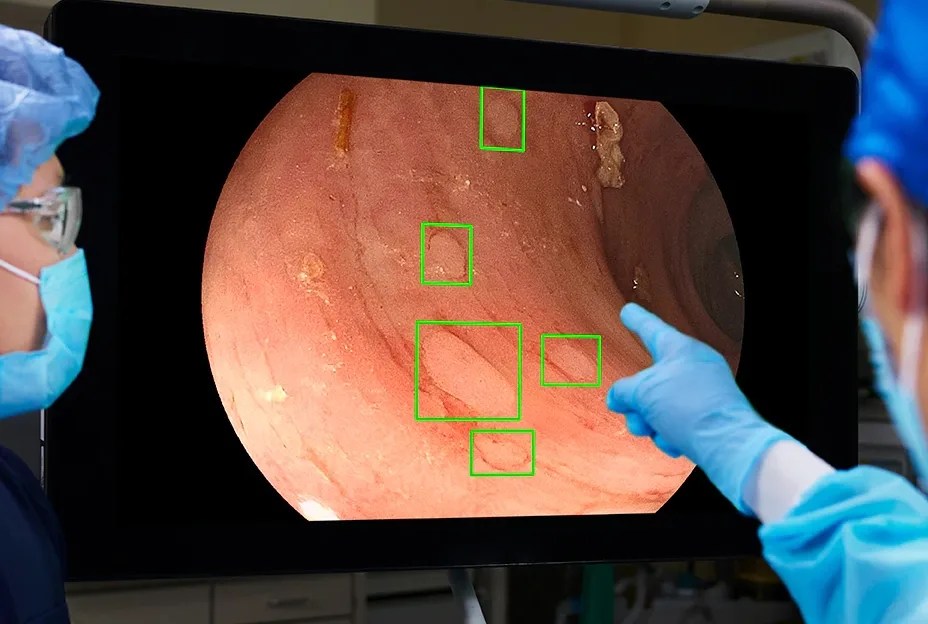Colorectal cancer is the second leading cause of cancer death for both men and women in the United States. VA is deploying artificial intelligence (AI) technology for use during colonoscopy to assist in recognizing pre-cancerous growths (aka “polyps”) and to add to the best-in-class care available to Veterans across the nation.
Why Artificial Intelligence?
VA is installing the AI devices to assist with polyp detection during colonoscopy in approximately 40 VA facilities this year. These devices have been demonstrated to increase the polyp detection rate by 14.4 percent during routine colonoscopies.
Deploying AI to assist with colonoscopy demonstrates VA’s commitment to best-in-class, innovative care. With better detection, we can reduce colorectal cancer deaths across the Veteran population.
Polyp detection is important for preventing colorectal cancer incidence and death. Prior studies have shown that every 1 percent increase in the rate of detection of pre-cancerous polyps is associated with a 3 percent decreased future risk of colorectal cancer incidence and a 5 percent decreased future risk of death from it. VA doctors have a proven success record when it comes to finding pre-cancerous polyps, with an average rate of 46 percent, well above the benchmark of 30 percent for colonoscopy in men in the general population.
Who is at Risk for Colorectal Cancer?
According to the American Cancer Society, approximately 151,000 Americans will be diagnosed with colorectal cancer in 2022, and over 52,000 will die from this disease that affects both men and women of all races and ethnic groups.
Veterans who are 45-75 years old are strongly encouraged to talk to their VA provider about the need for colorectal cancer screening and what screening options are available.
Why VA Encourages Colorectal Cancer Screening
Regular colorectal cancer screenings are key to staying on top of your health and may decrease your risk of dying from colorectal cancer by upwards of 68%.
VA offers multiple screening options for Veterans, including home-based screening with a fecal immunochemical test (FIT) that checks for blood in stool, traditional colonoscopies, and flexible sigmoidoscopies.
VA performs nearly 300,000 colonoscopies each year. Research has demonstrated the quality of these colonoscopies is very high and exceeds established national quality benchmarks.
Contributing to the Goals of Cancer Moonshot
More than 43,000 Veterans are diagnosed with cancer each year and millions are considered at risk. VA is contributing to the goals of Cancer Moonshot which aims to reduce the cancer death rate by half within 25 years, by deploying innovative technologies like AI to improve outcomes.
To learn more about cancer care at VA, visit cancer.va.gov or email cancer@va.gov
To learn more about colorectal cancer screening, visit the Centers for Disease Control’s website.
Visit My HealtheVet to learn tips and tools to help you partner with your health care team, so together you may work to manage your health.
Topics in this story
More Stories
The Medical Foster Home program offers Veterans an alternative to nursing homes.
Watch the Under Secretary for Health and a panel of experts discuss VA Health Connect tele-emergency care.
The 2024 National Veteran Suicide Prevention Annual Report provides the foundation for VA’s suicide prevention programs and initiatives.







in 25 years, all WWII and Korean vets will be gone and most of us Vietnam vets. So, the cancer rate will go down having nothing to do with Biden’s moonshot. I cannot get compensation for 50 years of neuropathy because I cannot prove early onset. The 5 stages of neuropathy prove it is almost impossible to correctly diagnose neuropathy in the early stages. Information from the Mayo and Cleveland clinic. My civilian took almost 20 years to finally have me tested for Neuropathy. Do you think a corpsman aboard my destroyer who received his training in the late 50’s and early 60’s would be able to diagnose Neuropathy? Thats why there is nothing in my military health records.
Do you offer Cologard, if not why not?
Very good information. Didn’t know anything about AI until now.
Too bad to many veterans are going to die before the VA even attempts to process their claims or evaluations.
Which VA facilities have, or are getting, this new AI capability?
And for those over 75?
“Veterans who are 45-75 years old are strongly encouraged to talk to their VA provider about the need for colorectal cancer screening and what screening options are available.”
VA providers I’ve encountered generally don’t ask questions or do exams. As stated above you need to ask them.